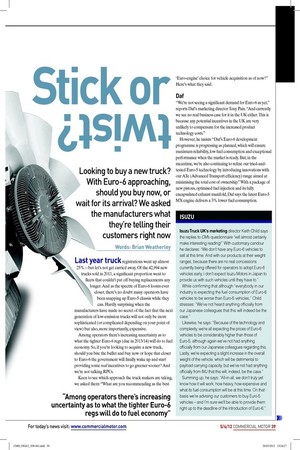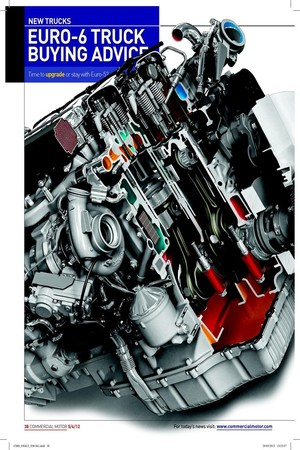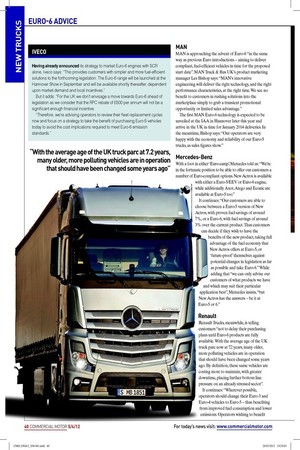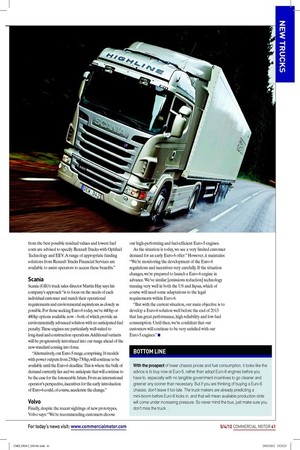tick or
Page 31

Page 30

Page 32

Page 33

If you've noticed an error in this article please click here to report it so we can fix it.
Looking to buy a new truck? With Euro-6 approaching, should you buy now, or wait for its arrival? We asked the manufacturers what they’re telling their customers right now
Words: Brian Weatherley
NEW TRUCKS
EURO-6 TRUCK BUYING ADVICE
Time to upgrade or stay with Euro-5?
Last year truck registrations went up almost 25%—but let’s not get carried away. Of the 42,994 new trucks sold in 2011, a signiicant proportion went to leets that couldn’t put off buying replacements any longer. And as the spectre of Euro-6 looms ever closer, there’s no doubt many operators have been snapping up Euro-5 chassis while they can. Hardly surprising when the manufacturers have made no secret of the fact that the next generation of low-emission trucks will not only be more sophisticated (or complicated depending on your point of view) but also, more importantly, expensive.
Among operators there’s increasing uncertainty as to what the tighter Euro-6 regs (due in 2013/14) will do to fuel economy. So, if you’re looking to acquire a new truck, should you bite the bullet and buy now or hope that closer to Euro-6 the government will inally wake up and start providing some real incentives to go greener sooner? And we’re not talking RPCs.
Keen to see which approach the truck makers are taking, we asked them: “What are you recommending as the best ‘Euro-engine’ choice for vehicle acquisition as of now?” Here’s what they said.
Daf
“We’re not seeing a signiicant demand for Euro-6 as yet,” reports Daf’s marketing director Tony Pain. “And currently we see no real business case for it in the UK either. This is because any potential incentives in the UK are very unlikely to compensate for the increased product technology costs.” However, he insists: “Daf’s Euro-6 development programme is progressing as planned, which will ensure maximum reliability, low fuel consumption and exceptional performance when the market is ready. But, in the meantime, we’re also continuing to reine our tried-andtested Euro-5 technology by introducing innovations with our ATe (Advanced Transport eficiency) range aimed at minimising the total cost of ownership.” With a package of new pistons, optimised fuel injection and its fully encapsulated exhaust manifold, Daf says the latest Euro-5 MX engine delivers a 3% lower fuel consumption.
ISUZU
Isuzu Truck UK’s marketing director Keith Child says the replies to CM’s questionnaire “will almost certainly make interesting reading!” With customary candour he declares: “We don’t have any Euro-6 vehicles to sell at this time. And with our products at their weight ranges, because there are no real concessions currently being offered for operators to adopt Euro-6 vehicles early, I don’t expect Isuzu Motors in Japan to provide us with such vehicles until they have to.”
While confirming that although “everybody in our industry is expecting the fuel consumption of Euro-6 vehicles to be worse than Euro-5 vehicles,” Child stresses: “We’ve not heard anything officially from our Japanese colleagues that this will indeed be the case.” Likewise, he says: “Because of the technology and complexity, we’re all expecting the prices of Euro-6 vehicles to be considerably higher than those of Euro-5, although again we’ve not had anything officially from our Japanese colleagues regarding this. Lastly, we’re expecting a slight increase in the overall weight of the vehicle, which will be detrimental to payload carrying capacity, but we’ve not had anything officially from IMJ that this will, indeed, be the case.” Summing up, he says: “All-in-all, we don’t truly yet know how it will work, how heavy, how expensive and what its fuel consumption will be at this time. On that basis we’re advising our customers to buy Euro-5 vehicles – and I’m sure we’ll be able to provide them right up to the deadline of the introduction of Euro-6.”
IVECO
Having already announced its strategy to market Euro-6 engines with SCR alone, Iveco says: “This provides customers with simpler and more fuel-efficient solutions to the forthcoming legislation. The Euro-6 range will be launched at the Hannover Show in September and will be available shortly thereafter, dependent upon market demand and local incentives.” But it adds: “For the UK we don’t envisage a move towards Euro-6 ahead of legislation as we consider that the RPC rebate of £500 per annum will not be a significant enough financial incentive.
“Therefore, we’re advising operators to review their fleet replacement cycles now and focus on a strategy to take the benefit of purchasing Euro-5 vehicles today to avoid the cost implications required to meet Euro-6 emission standards.”
MAN
MAN is approaching the advent of Euro-6 “in the same way as previous Euro introductions – aiming to deliver compliant, fuel-eficient vehicles in time for the proposed start date”. MAN Truck & Bus UK’s product marketing manager Les Bishop says: “MAN’s innovative engineering will deliver the right technology, and the right performance characteristics, at the right time. We see no beneit to customers in rushing solutions into the marketplace simply to grab a transient promotional opportunity or limited sales advantage.” The irst MAN Euro-6 technology is expected to be unveiled at the IAA in Hannover later this year and arrive in the UK in time for January 2014 deliveries. In the meantime, Bishop says: “Our operators are very happy with the economy and reliability of our Euro-5 trucks, as sales igures show.”
Mercedes-Benz
With a foot in either ‘Euro-camp’, Mercedes told us: “We’re in the fortunate position to be able to offer our customers a number of Euro-compliant options. New Actros is available with either a Euro-5/EEV or Euro-6 engine, while additionally Axor, Atego and Econic are available at Euro-5 too.” It continues: “Our customers are able to choose between a Euro-5 version of New Actros, with proven fuel savings of around 7%, or a Euro-6, with fuel savings of around 3% over the current product. Thus customers can decide if they wish to have the beneits of the new product, taking full advantage of the fuel economy that New Actros offers at Euro-5, or ‘future-proof’ themselves against potential changes in legislation as far as possible and take Euro-6.” While adding that “we can only advise our customers of what products we have and which may suit their particular application best” , Mercedes insists, “but New Actros has the answers – be it at Euro-5 or 6.”
Renault
Renault Trucks, meanwhile, is telling customers “not to delay their purchasing plans until Euro-6 products are fully available. With the average age of the UK truck parc now at 7.2 years, many older, more polluting vehicles are in operation that should have been changed some years ago. By deinition, these same vehicles are costing more to maintain, with greater downtime, placing further bottom line pressure on an already stressed sector”.
It continues: “Wherever possible, operators should change their Euro-3 and Euro-4 vehicles to Euro-5 – thus beneiting from improved fuel consumption and lower emissions. Operators wishing to beneit from the best possible residual values and lowest fuel costs are advised to specify Renault Trucks with Optifuel Technology and EEV. A range of appropriate funding solutions from Renault Trucks Financial Services are available to assist operators to access these beneits.”
Scania
Scania (GB)’s truck sales director Martin Hay says his company’s approach “is to focus on the needs of each individual customer and match their operational requirements and environmental aspirations as closely as possible. For those seeking Euro-6 today, we’ve 440hp or 480hp options available now – both of which provide an environmentally advanced solution with no anticipated fuel penalty. These engines are particularly well-suited to long-haul and construction operations. Additional variants will be progressively introduced into our range ahead of the new standard coming into force.
“Alternatively, our Euro-5 range, comprising 16 models with power outputs from 230hp-730hp, will continue to be available until the Euro-6 deadline. This is where the bulk of demand currently lies and we anticipate that will continue to be the case for the foreseeable future. From an international operator’s perspective, incentives for the early introduction of Euro-6 could, of course, accelerate the change.”
Volvo
Finally, despite the recent sightings of new prototypes, Volvo says: “We’re recommending customers choose our high-performing and fuel-eficient Euro-5 engines.
As the situation is today, we see a very limited customer demand for an early Euro-6 offer.” However, it maintains: “We’re monitoring the development of the Euro-6 regulations and incentives very carefully. If the situation changes, we’re prepared to launch a Euro-6 engine in advance. We’ve similar [emissions reduction] technology running very well in both the US and Japan, which of course will need some adaptations to the legal requirements within Euro-6.
“But with the current situation, our main objective is to develop a Euro-6 solution well before the end of 2013 that has great performance, high reliability and low fuel consumption. Until then, we’re conident that our customers will continue to be very satisied with our Euro-5 engines.” ■
BOTTOM LINE
With the prospect of lower chassis prices and fuel consumption, it looks like the advice is to buy now at Euro-5, rather than adopt Euro-6 engines before you have to, especially with no tangible government incentives to go cleaner and greener any sooner than necessary. But if you are thinking of buying a Euro-5 chassis, don’t leave it too late. The truck makers are already predicting a mini-boom before Euro-6 kicks in, and that will mean available production slots will come under increasing pressure. So never mind the bus, just make sure you don’t miss the truck...











































